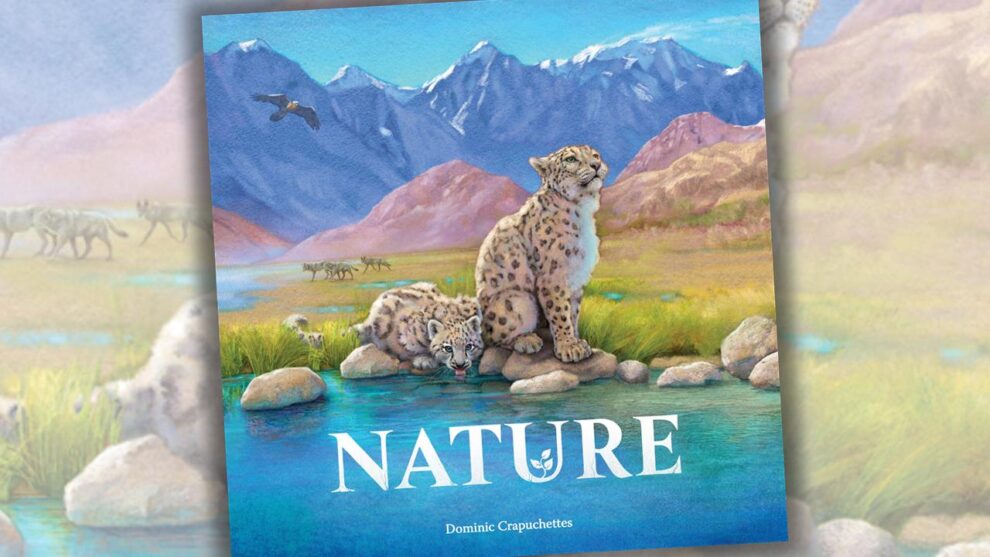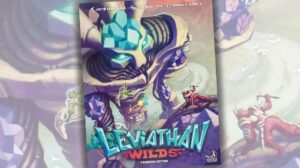Disclosure: Meeple Mountain received a free copy of this product in exchange for an honest, unbiased review. This review is not intended to be an endorsement.
Dominic Crapuchettes, the co-designer of Evolution, Evolution: Climate, and one of the designers of the Evolution-adjacent Oceans, had a list of design issues with the successful series. Most of them, he found, weren’t fixable. They were inherent to the system. The only solution was to start over. So that’s what he did.
The result is Nature, a game that will be instantly familiar to anyone who’s played Evolution. This is explicitly Evolution 2.0, an attempt to make the game leaner, meaner, and more flexible. The central idea of gameplay remains the same: create and evolve species that are better at eating than anyone else.
First things first, you receive a new species. Isn’t it cute? They always start both physically small and numerically insignificant: a size of 1 and a population to match. This is your blank canvas. You use the cards in your hand to increase size, population, or add traits. Traits are the heart of the game, but they’re better explained after you have a sense of play, so I’ll circle back.
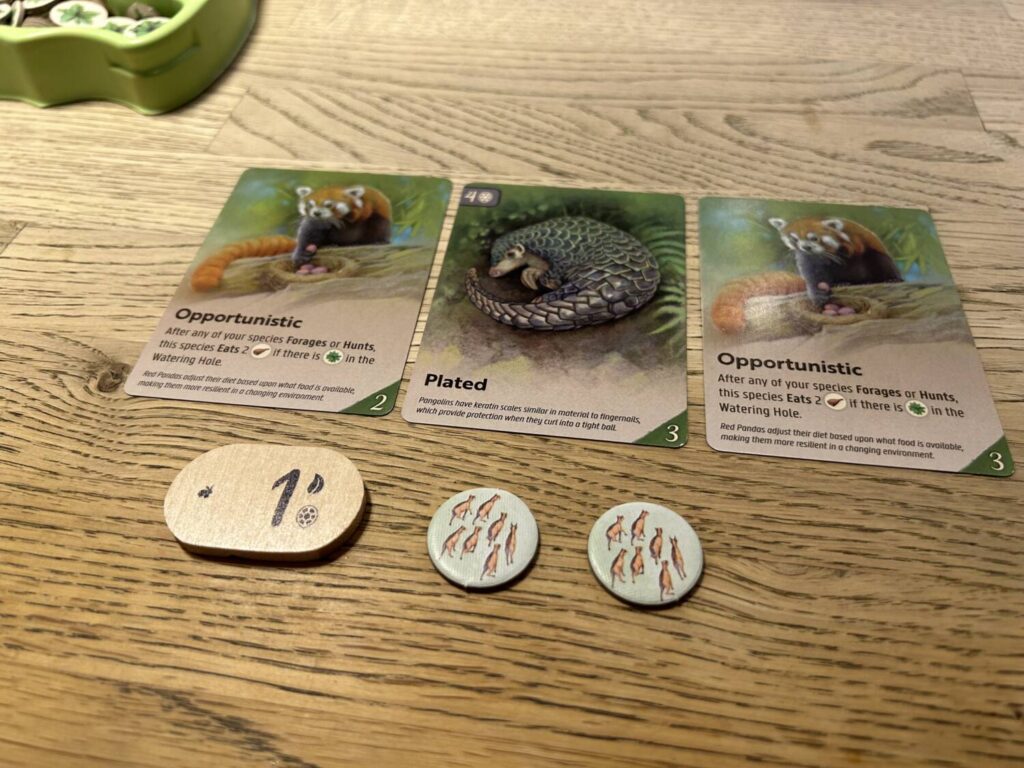
Once everyone has chosen how to evolve their species, it’s time for a road test. Each player, in turn, activates a single species. Every species defaults to foraging, finding food in the supply of vegetation tokens in the middle of the table. Larger species eat more food at once, while species with more population can ultimately hold more food. The dream, of course, is to have large size and high density, but that may not be something the ecosystem can sustain. The amount of vegetation available every round is subject to a single card flop at the top of setup. If you happen to reveal a 1, meaning there will be one token added per player at the top of every round, strap in for a bumpy ride. Unfed populations die off, so people are likely to turn Predator.
Predators work a bit differently, and will be favorites for the aggressive players in your group. Rather than eating up tokens from the central stock, predatory animals attack other species. Here, the significance of size changes to offense and defense. A Predator can only attack an animal of equal or lesser girth. They kill off one population, and take an amount of food tokens equal to the size of the prey. Any eligible species at the table can be chosen, and a Predator has to hunt if it can. That can mean, later in the game, that one of your predators has to go after another of your own species. Comedy gold. We love to see it.
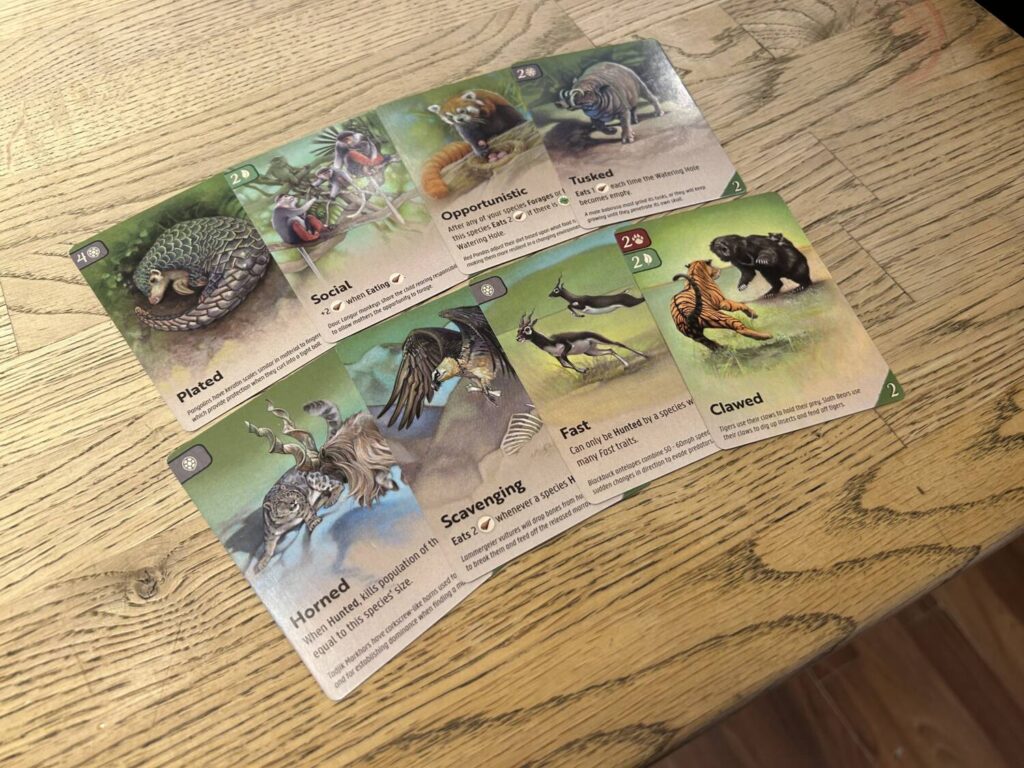
A major change from Evolution, probably the key change as far as how Nature feels as an experience, relates to death. In Evolution, your hunted and starved populations are wiped out, gone forever. It’s easy for a player with an early lead to dominate the entire game. In Nature, you get your lost population back. They join the new species you gain at the start of the next round. The more punishing a round you have, the harder your next species will be able to come out swinging. It is entirely possible for a keen player to come back from the brink in Nature, something that’s much harder to say about its older brother.
Back to those traits. Some increase your defensive capability, making it harder for animals to hunt you. Others improve your ability to forage, or give you access to alternative food sources. Traits are the area in which it is most evident that Nature is an improvement on a previous design. Evolution had 17 different possible cards in the deck. Nature has eight. Much as brevity is the soul of wit, so is it the heart of good game design. Where Evolution occasionally felt chaotic and unwieldy, Nature makes you a much more intentional god.
Even within the relatively narrow parameters of only eight traits, the variability of Nature is impressive. It’s a remarkably reactive game. When everyone is playing well, one player making different choices has knock-on effects that force everyone else to diverge from their chosen course. I’ve played probably half a dozen sessions of the base game, and no two have felt the same. And that’s before we take the modules into account.
Mod Squad
Nature is a modular system, which gives players more control over the type of experience they have. Five modules—Rainforest, Arctic Tundra, Natural Disasters, Flying, and Dinosaurs—are part of the initial release, and each brings a unique flavor to proceedings.
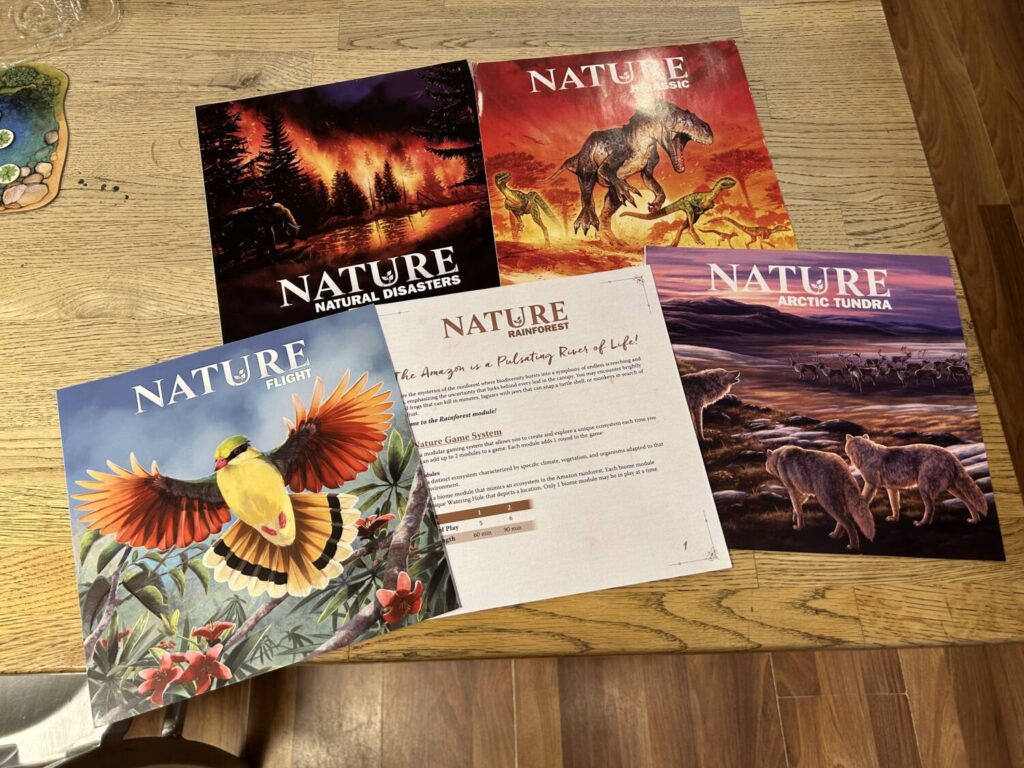
The Rainforest is bountiful, allowing for explosive population growth and unlimited food resources—at least, for those species who can climb.
The Arctic Tundra, as you might imagine, is just the opposite, with scarce resources and population dying off due to the weather. The Arctic Tundra module is Nature on hard mode.
Natural Disasters are for those who hate planning and love a bit of drama. Every round, a new rule or instant effect is introduced, causing all variety of potential calamity.
The Flying module is probably my favorite. It features my favorite set of traits and introduces migration to the game, which brings in some fairly subtle timing considerations.
The Dinosaurs seem to be the consensus favorite, and I can understand why. It’s fun to have all those big, aggressive Dinos stomping around. The final production version of Nature is going to use dials instead of stacks of wooden tokens—an aesthetic loss that is also an inarguable quality of life improvement—but having an 8-token high pile of Predator is a hoot.
Not only do each of these five spices taste good on their own, you can mix and match. When playing with modules, players can draw cards at the top of the round from any combination of decks. If I want two Dinosaur cards and a core card and two Flying cards, I can do that. Cooler still, that gives the other players some sense of what sorts of shenanigans I might have planned, and may influence what decisions they make. The plan going forward, as I understand it, is to release two new modules a year for the foreseeable future. That should ensure that Nature will have plenty of variety to keep you entertained.
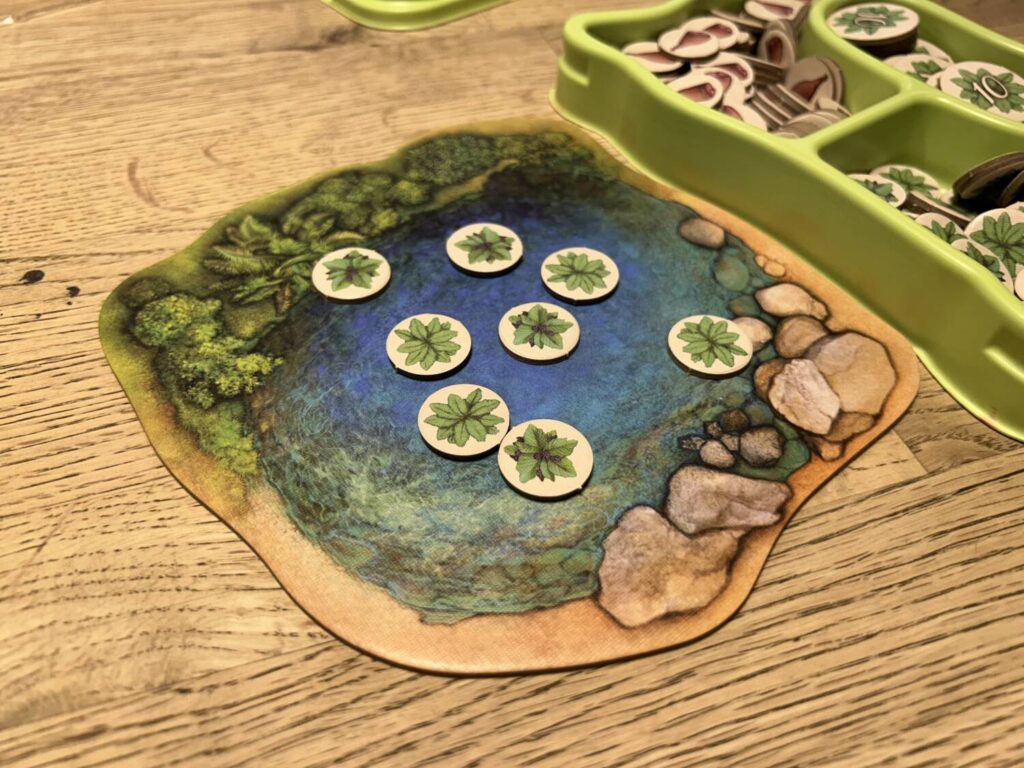
Natural Selection
I’ve played Nature a few times in various stages of development over the last three years. From the first play, it was obvious this was something special, and it has only gotten better with time. My review copy is an early one, and there have been numerous small adjustments since even that was printed. Card effects have been modified. Some of the components are changing to make the game more user-friendly. But what has been consistent, every time I’ve sat down to play, has been the feeling that Nature is an exciting and excellent system.
The surest indicator I have of Nature’s quality has been the response to it from players. Time after time, group after group, with all variety of gaming tastes, I have yet to see a group finish a game without wanting to immediately dive back in, either to try the same setup again, or to test the waters on another combination of modules. Nature is crackerjack stuff.


